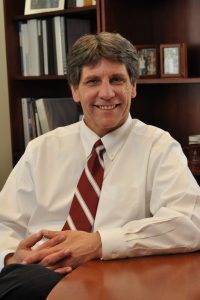Dean Steve Matson discusses Carolina’s role in groundbreaking project on graduate alumni career trajectories, students’ professional goals

The world of graduate education is changing. Over the past two decades, at least, it has become clear that major research universities, like Carolina, are producing more doctoral-educated students who ultimately make their careers outside of academia than those who stay within the academy as researchers or university professors. This shift is important to understand if we want to effectively support our students, faculty and programs.
While we know from our exit survey data that only about one-third of our students will be employed outside the academy immediately after graduation, we also know that many others migrate away after a few years. If we want to know more about this migration, first we need to understand the career trajectory of our students, both within and outside the academy. This is the goal of the groundbreaking Understanding PhD Career Pathways for Program Improvement project. As one of only 29 universities nationwide selected to participate in this project, UNC-Chapel Hill (and our alumni) will have a crucial role to play.
I am excited about the ways this information will allow graduate programs – especially at Carolina – to better prepare students for careers in the 21st century.
Over the next three years, The Graduate School will survey doctoral alumni who are three, eight and 15 years post-graduation. Every participant will be answering a set of standardized questions to provide national data and to allow benchmarking. The surveys will ask a range of questions about career trajectory, preparedness and satisfaction. If you receive a survey, please take time to complete and return it. This information is vital to understanding the overall career trajectory of Ph.D. students.
In addition, The Graduate School will survey doctoral students in the second and fifth years of their programs about their career aspirations.
The anonymized data will contribute to an unprecedented view of careers for doctoral students. Nationally, the Council of Graduate Schools will use the results to inform conversations on graduate education. Survey responses from Carolina alumni will also guide our own campus efforts to provide our students with an understanding of the range of careers possible with a Ph.D. In addition, this information will be broadly shared with programs as they work to provide the most relevant education to their students.
I am excited about the ways this information will allow graduate programs – especially at Carolina – to better prepare students for careers in the 21st century. I also believe we will learn more about how our doctoral students contribute to the public good.
Since the pilot phase of this project includes graduate programs in the humanities and STEM disciplines, not all alumni will receive a survey this fall. For those in other disciplines, I encourage you to add your Tar Heel footprint to our footprints page. This site also provides information on the diversity of careers that engage our students. Our alumni are not only global in their reach, they are making a difference in nearly all walks of life. We are preparing the leaders of tomorrow.
Steven W. Matson, Ph.D.
Dean, The Graduate School
Professor of Biology
UNC-Chapel Hill
